Related Research Articles
Gonars is a town and comune (municipality) in the Regional decentralization entity of Udine in Friuli, Friuli-Venezia Giulia, northeastern Italy. It is located near Palmanova.
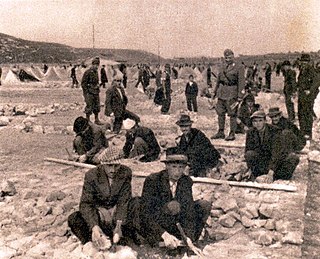
The Rab concentration camp was one of several Italian concentration camps. It was established during World War II, in July 1942, on the Italian-annexed island of Rab.

Italian war crimes have mainly been associated with Fascist Italy in the Pacification of Libya, the Second Italo-Ethiopian War, the Spanish Civil War, and World War II.
Fascist Legacy is a 1989 BBC documentary TV miniseries about Italian war crimes during World War II. It consists of two parts.
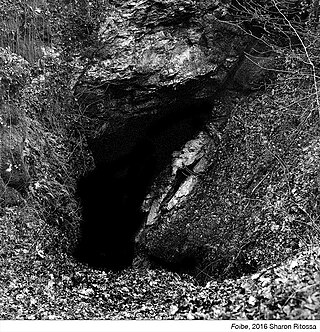
A foiba — jama in South Slavic languages scientific and colloquial vocabulary — is a type of deep natural sinkhole, doline, or sink, and is a collapsed portion of bedrock above a void. Sinks may be a sheer vertical opening into a cave or a shallow depression of many hectares. They are common in the Karst (Carso) region shared by Italy and Slovenia, as well as in a karst of Dinaric Alps in Bosnia and Herzegovina, Montenegro and, Croatia. The foibe massacres, a war crime that took place during and after World War II, take their name from the foibe.

The Istrian–Dalmatian exodus was the post-World War II exodus and departure of local ethnic Italians as well as ethnic Slovenes and Croats from Yugoslavia. The emigrants, who had lived in the now Yugoslav territories of the Julian March, Kvarner and Dalmatia, largely went to Italy, but some joined the Italian diaspora in the Americas, Australia and South Africa. These regions were ethnically mixed, with long-established historic Croatian, Italian, and Slovene communities. After World War I, the Kingdom of Italy annexed Istria, Kvarner, the Julian March and parts of Dalmatia including the city of Zadar. At the end of World War II, under the Allies' Treaty of Peace with Italy, the former Italian territories in Istria, Kvarner, the Julian March and Dalmatia were assigned to now Communist-helmed Federal Yugoslavia, except for the Province of Trieste. The former territories absorbed into Yugoslavia are part of present-day Croatia and Slovenia.

The Gonars concentration camp was one of the several Italian concentration camps and it was established on February 23, 1942, near Gonars, Italy.

The Province of Ljubljana was the central-southern area of Slovenia. In 1941, it was annexed by the Kingdom of Italy, and after 1943 occupied by Nazi Germany. Created on May 3, 1941, it was abolished on May 9, 1945, when the Slovene Partisans and partisans from other parts of Yugoslavia liberated it from the Nazi Operational Zone of the Adriatic Littoral. Its administrative centre was Ljubljana.

Gastone Gambara was an Italian General who participated in World War I and World War II. He excelled during the Italian intervention in favor of the nationalists in the Spanish Civil War. During World War II, he had an outstanding role in the North African campaign and the repression of partisans in Yugoslavia.
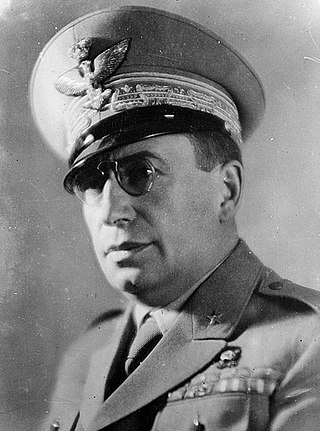
Mario Roatta was an Italian general. After serving in World War I he rose to command the Corpo Truppe Volontarie which assisted Francisco Franco's force during the Spanish Civil War. He was the Deputy Chief of Staff of the Italian Army from October 1939 to March 1941 and from March 1941 to January 1942 its Chief of Staff and helped in preparing for the invasion of Yugoslavia.

The foibe massacres, or simply the foibe, refers to mass killings and deportations both during and immediately after World War II, mainly committed by Yugoslav Partisans and OZNA in the then-Italian territories of Julian March, Kvarner and Dalmatia, against local Italians and Slavs, primarily members of fascist and collaborationist forces, and civilians opposed to the new Yugoslav authorities. The term refers to some victims who were thrown alive into the foibe., deep natural sinkholes characteristic of the Karst Region. In a wider or symbolic sense, some authors used the term to apply to all disappearances or killings of Italian and Slavic people in the territories occupied by Yugoslav forces. Others included deaths resulting from the forced deportation of Italians, or those who died while trying to flee from these contested lands.

Dane is a village in the Municipality of Loška Dolina in the Inner Carniola region of Slovenia, on the border with Croatia.
The Porzûs massacre was an intra-partisan massacre of the Italian resistance during late World War II, on 7 February 1945. It saw the killings of 17 partisans belonging to the Brigate Osoppo, a strongly Catholic formation, by communist partisans of the Gruppi di Azione Patriottica. Four members of Brigate Osoppo were killed when a group of them was ambushed, while the survivors were taken prisoner and summarily executed in the following days. The event is still the object of study and controversy in Italy.

Giuseppe Cobolli Gigli was an Italian engineer and politician. From 1935 to 1939, he was member of Benito Mussolini's Italian fascist government as minister of public works.
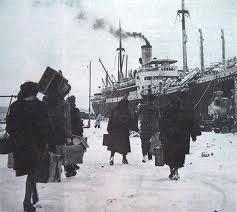
National Memorial Day of the Exiles and Foibe is an Italian commemoration of the victims of the Foibe and the Istrian–Dalmatian exodus, which led to the emigration of hundreds of thousands of local ethnic Italians from Yugoslavia after the end of the Second World War.
Giovanni Oliva is an Italian historian and politician.
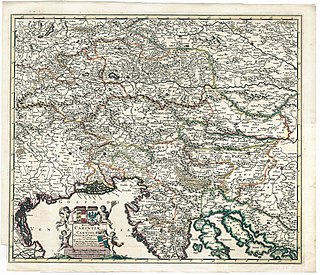
World War II in the Slovene Lands started in April 1941 and lasted until May 1945. The Slovene Lands were in a unique situation during World War II in Europe. In addition to being trisected, a fate which also befell Greece, Drava Banovina was the only region that experienced a further step—absorption and annexation into neighboring Nazi Germany, Fascist Italy, and Hungary. The Slovene-settled territory was divided largely between Nazi Germany and the Kingdom of Italy, with smaller territories occupied and annexed by Hungary and the Independent State of Croatia.

The Podhum massacre was the mass murder of Croat civilians by Italian occupation forces on 12 July 1942, in the village of Podhum, in retaliation for an earlier Partisan attack.
Renato Coturri was an Italian general during World War II.
References
- 1 2 Paolo Rumiz, Moni Ovadia (2008-04-13). "Lager d'Italia - Il coraggio che non abbiamo" (PDF). La Repubblica. Archived from the original (PDF) on 2014-07-13. Retrieved 2012-03-12.
- ↑ Di Sante, Costantino (2005) Italiani senza onore: I crimini in Jugoslavia e i processi negati (1941-1951), Ombre Corte, Milano. (Archived by WebCite®)
- ↑ Conti, Davide (2011). "Criminali di guerra Italiani". Odradek Edizioni. Retrieved 2012-10-14.
- 1 2 Effie G. H. Pedaliu (2004) Britain and the 'Hand-over' of Italian War Criminals to Yugoslavia, 1945-48. Journal of Contemporary History. Vol. 39, No. 4, Special Issue: Collective Memory, pp. 503-529 (JStor.org preview)
- ↑ "Article". Senza Soste. 2010-02-10. Retrieved 2012-03-09.
- ↑ Rory, Carroll (2003) Italy's bloody secret. (Archived by WebCite®), The Guardian , London, UK, June 25
- ↑ Rory, Carroll. Italy's bloody secret. The Guardian. (Archived by WebCite®), The Guardian, London, UK, June 25, 2003
- ↑ Alessandra Kersevan (2008) Foibe - Revisionismo di stato e amnesie della repubblica. Kappavu, Udine.
- ↑ Survivors of war camp lament Italy's amnesia, 2003, International Herald Tribune
- ↑ "Italian state TV has been manipulating with the photo of Slovene hostages (Slovene: RAI manipuliral s fotografijo slovenskih talcev". RTV Slovenia. 2012-02-14. Retrieved 2012-03-09.
- ↑ James H. Burgwyn: "General Roatta's war against the partisans in Yugoslavia: 1942", Journal of Modern Italian Studies, Volume 9, Number 3, September 2004, pp. 314-329(16), link by IngentaConnect
- ↑ Smargiassi, Michele (23 March 2012). "Non dire falsa testimonianza" [You shall not give false testimony]. La Repubblica (in Italian). Rome . Retrieved 15 February 2017.
- ↑ "Ministry of foreign affairs of the Republic of Slovenia protests against the falsification of historical facts". RTV Slovenia. 2012-02-15. Retrieved 2012-03-09.
- ↑ Talk show "Il giorno del ricordo - Porta a Porta", emitted by the Italian state-owned TV station RAI, official website
- ↑ Alberto Bobbio (2004-02-08). "Pulizia etnica all\'italiana". Famiglia Cristiana. Archived from the original on June 12, 2011. Retrieved 2012-03-12. (Archived by WebCite®)
- ↑ "Foibe - Revisionismo di stato e amnesie della repubblica". Kappa Vu. Archived from the original on 2012-04-19. Retrieved 2012-03-09.